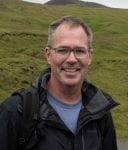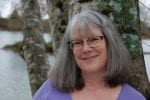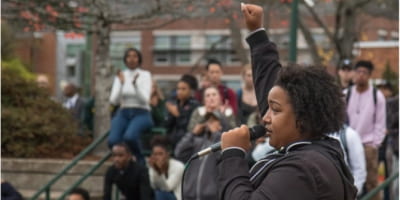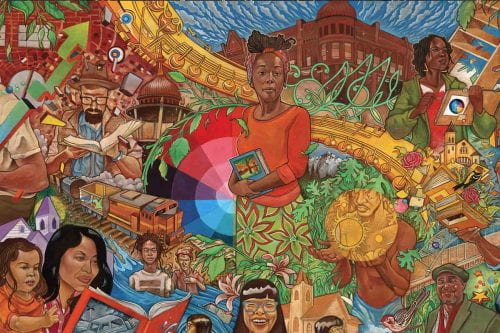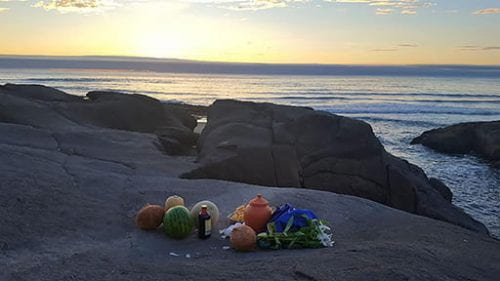Sustainability Fellows Program will focus on essential work!
 According to the Bureau of Labor Statistics, essential workers represent 34-43% of the U.S. workforce. They earn low wages, have insecure or no benefits, and struggle with the most precarious job security and working conditions of any segment of American labor. Many have limited access to financial, health, legal, and familial support systems while they risk their lives keeping the country afloat during the pandemic. In Oregon, these ironies are especially dangerous for recent Latinx immigrants from Mexico and Central America—including one of the fastest growing indigenous Mayan Mam populations in the U.S.—who remain undocumented or on migrant-labor visas. The interrelated crises of systemic racism, climate change, and the pandemic make clear to us that we need new ways to map, visualize, and imagine the PNW in order to prepare strategically for just transitions that address economic dignity, immigrant rights, and the integrity of our climate.
According to the Bureau of Labor Statistics, essential workers represent 34-43% of the U.S. workforce. They earn low wages, have insecure or no benefits, and struggle with the most precarious job security and working conditions of any segment of American labor. Many have limited access to financial, health, legal, and familial support systems while they risk their lives keeping the country afloat during the pandemic. In Oregon, these ironies are especially dangerous for recent Latinx immigrants from Mexico and Central America—including one of the fastest growing indigenous Mayan Mam populations in the U.S.—who remain undocumented or on migrant-labor visas. The interrelated crises of systemic racism, climate change, and the pandemic make clear to us that we need new ways to map, visualize, and imagine the PNW in order to prepare strategically for just transitions that address economic dignity, immigrant rights, and the integrity of our climate.
Various outcomes will emerge from the Sustainability Faculty Fellows Program and the Just Futures Fellowships, coordinated by UO’s Office of Sustainability (OS) and the UO Student Sustainability Center (SSC), as detailed below. Perhaps the most important result of these projects will be relationships with community partners throughout our region. We have also laid the groundwork for a collaborative digital publication through a recent CEF symposium about PNW essential workers in the time of COVID-19, held in October 2020, and consultations with the Research Action Design (RAD) collective, which specializes in participatory design and community-led research with BIPoC communities. Called the PNW Atlas of Essential Work, this digital publication will be a joint project with our institutional partners, the University of Idaho, Whitman College, and Heritage University, a private institution on the rural Yakama Indian Reservation that is a Native American Service Institution (12% American Indian or Alaska Native) as well as the only Hispanic Serving Inistitution in Washington state (69% Hispanic/Latino). The Atlas will be designed and hosted at UO.
The University of Oregon Office of Sustainability (OS) will re-orient the existing Sustainability Fellows program to focus on essential workers. We will work closely with the Center for Environmental Futures on this program. Our purpose is to foster student-led research into the experiences and lives of essential but invisible workers, showcase this research through digital storytelling, and develop a robust pedagogy for racial justice in the humanities and allied fields. Already, OS program manager Sarah Stoeckl is creating a pedagogical toolkit for faculty and students who want to contribute to the PNW Atlas of Essential Work, and we have begun researching the labor conditions of essential workers on the UO campus, including how these workers have been impacted by recent wildfires. Many of our campus’ essential workers are BIPoC, and some are nontraditional students working on their bachelor’s degree . We will broaden this very local scope to take in Oregon and the region. We hope that the Atlas project empowers BIPoC students to share the too often ignored or erased stories of their families and communities. Furthermore, this new emphasis on the relationships among economic dignity, anti-racism, and the ecological integrity necessary for sustainable lifeways will allow the UO to build on an existing partnership with Heritage University on the Yakama Reservation.
The Sustainability Fellows program supports faculty who want to build community-engaged research around sustainability into their curriculum. This support comes in the form of a pedagogy workshop, research stipends for participation, funding to bring projects to life, and connections to local community partners. Re-orienting our existing program as part of Sustaining Essential Work furthers the Office of Sustainability’s goal to emphasize social sustainability in our mission and spotlight the interconnections between environmental, social, and racial injustices. Interested faculty will apply for pedagogical support for such community-engaged research in their courses through the OS, in response to a campus-wide advertisement. We will accept ten fellows per year up to three of whom will come from Heritage University. Selection of the fellows will be made by a committee made up of OS administrators and members of the CEF Steering Committee
Sustainability Fellows will begin the program in the summer by participating in a multi-day workshop and developing their learning plans, for which they will receive an initial stipend ($500). They will have the academic year to implement their pedagogical projects, then the following summer they will share digital artifacts and reflections, for which they receive a second stipend ($1000). Faculty can also request up to $1000 in support funds for class projects, i.e. honoraria for class speakers or community partners, the services of an hourly graduate student to hone undergraduate research into a professional document or artifact, or special supplies. In the third year of the grant, a Sustainability Symposium will showcase the projects developed by faculty and students, including partners at Heritage University. The OS will provide support for the development of class project plans and help identify community partners.
In the second of our campus-wide projects on sustaining racial justice and economic dignity, UO’s Student Sustainability Center (SSC), led by Taylor McHolm, will establish Just Futures Fellowships to support and empower undergraduate and graduate students from frontline communities—those who are the first to bear the brunt of climate change— and to serve community partners. JF Fellows will receive training, mentorship, and summer stipends for their work with community partners, who will also be compensated for their engagement. Students will take methodological workshops and meet with compensated faculty advisors to identify community research needs and match them with partner organizations. JF Fellows will present their research during annual research symposia at community sites. For 2021, probable community partners are Pineros y Campesinos Unidos del Noroeste (PCUN) and Lummi Nation (Lhaq’temish) tribal leaders, along with a new Lummi-led 501(c)(3), Se’Si’Le. Both PCUN and Se’Si’Le support essential work, promote traditional ecological knowledge (TEK), and foster marginalized communities by protecting migrant farmers and native fisheries and fishers. Advertised campus-wide, JF Fellows will be selected following a rigorous application process in which selected fellows demonstrate academic preparedness, awareness of basic environmental justice principles, a demonstrated commitment to helping others, and the pledged support of a faculty advisor for the duration of their fellowships.
To complement efforts to foster community engaged pedagogies by OS and SSC, a team drawn from CEF, SAE, PPPM, OS, the Labor Education and Research Center (LERC), and the InfoGraphics Lab (all UO) will design the PNW Atlas of Essential Work. This Atlas will include histories and speculative futures of essential work, with an emphasis on the histories and stories of BIPoC workers who sustain our regional economy. Our purpose is to empower BIPoC students to share their stories; support faculty in developing racial justice-focused courses and project-based learning; and center Participatory-Action-Research methods and collaborative digital design to create an audiovisual epic of PNW race and labor histories—and futures.
In association with the Atlas, history professor Bob Bussel will lead an interdisciplinary group of scholars to document, evaluate, and host presentations at community centers about immigration in Oregon over the past decade. This research will result in a bilingual report, A State of Immigrants: A New Look at the Immigrant Experience in Oregon, and a webinar series about the rights of essential workers and evolving worker advocacy and activism. Bussel directs the Labor Education and Research Center (LERC) at the University of Oregon. He will serve as editor of the State of Immigrants report and coordinate its publication and disseminations. Lola Loustaunau, a PhD candidate in sociology at the University of Oregon, will conduct interviews with essential workers, provide Spanish translation, and assist Professor Bussel in writing the chapter report on immigrant workers. We will host a symposium, ““The Futures of Work, Climate, and Lifeways in the PNW” with our collaborating institutions (Heritage University, University of Idaho, and Whitman College), at which time we will launch both the PNW Atlas of Essential Work and the University of Idaho’s PNW Atlas of Fire and award prizes for the most innovative contributions from each campus.




